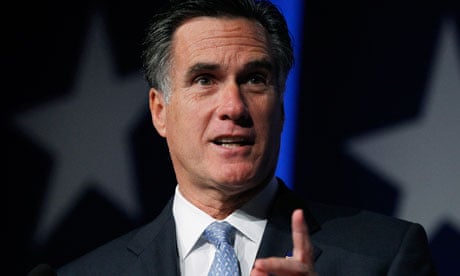Probably, the least boring aspect of the fight for the Republican presidential nomination is the role of religion in the US. Religion is the angle that political journalists are the least prepared to cover, so we get caricatures instead of a clear picture.
Surely you've read the notices of these distorted figures. Michele Bachmann is a wild-eyed, anti-Catholic theocrat. Rick Santorum manages to maintain a mystical grip on evangelicals, despite being Catholic and having gained little traction in the polls. The Methodist Rick Perry is a fundamentalist, racist, anti-Mormon Bible-thumper. Newt Gingrich is … well, OK, I will give you Newt Gingrich.
The latest eruption has been over Mormonism, the religion of frontrunner Mitt Romney and, incidentally, Jon Huntsman. Robert Jeffress, pastor of the Dallas megachurch First Baptist, is a Perry supporter. At the recent Values Voters Summit, he asked the mostly evangelical audience if they wanted a "candidate who is a good, moral person" – an obvious and not at all veiled reference to Romney – "or one who is a born-again follower of Jesus Christ"?
Jeffress later called Mormonism a "cult", though clarified that he meant a "theological cult" not a "sociological" one. Thus, he wasn't lumping the descendants of Joseph Smith in with the followers of Jim Jones and other crazies. The reverend also said that he would support Romney over President Obama in a general election because faith is "not the only criteri[on] by which we select a leader".
The bigotry accusations were duly reported in straight news write-ups and echoed in op-ed columns. LA Times columnist Jonah Goldberg accused Jeffress of practising ugly "dog-whistle politics" even though he was pretty darn clear. Democratic consultant Bob Shrum opportunistically lamented the opposition to Romney "on the shameful ground of religious bigotry".
Bioethicist Arthur Caplan flatly told Jeffrey Weiss, a columnist for my website RealClearReligion.org, that all "cult talk is hate talk". And in the "newthink" of modern America, hate speech isn't really speech at all. It's a series of sounds that we must not listen to, lest they injure our virgin ears.
That's too bad because those words might tell us something if we would only pay attention. Jeffress called Romney a "good, moral person" and said that he would support this Mormon over Obama, who famously renounced agnosticism to convert to Christianity. This is not an indication of intractable opposition to Mormon candidates but a move towards grudging acceptance.
True, Jeffress expressed a preference by saying that he would rather have a born-again candidate. He even called Romney a "non-Christian" and his religion a "cult". Yet, in the evangelical taxonomy, "non-Christian" belongs on a different and superior moral place than "unbeliever". Evangelicals have a very high opinion of religious Jews, to take the most obvious example.
As for the cult talk, in the reverend's clarification we can see not just Jeffress, but evangelicals generally groping for a new language to talk about Mormons. In a religious sense, evangelicals and Mormons are competitors. In politics, they tend to find themselves on the same side of an awful lot of issues – abortion, gay marriage, religious freedom, voting Republican – and they're not sure what to do about that.
My sense is that most American evangelicals would be happy to stop speaking of Mormons as cultists and assign their ministrations the status of non-Christian but respected religion – venerable and thus accepted. But then, missionaries for the Church of Jesus Christ of Latter Day Saints come knocking, and it's right back to square one.
One of those former Mormon missionaries, Mitt Romney, is running for president. He's got a decent shot at it, in part because he's good at dealing with rejection and ultimately overcoming it. Wherever could he have picked up that life lesson?
